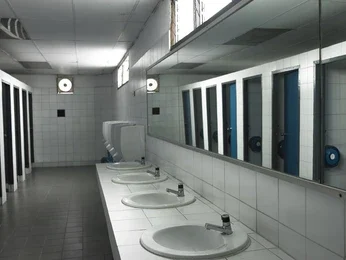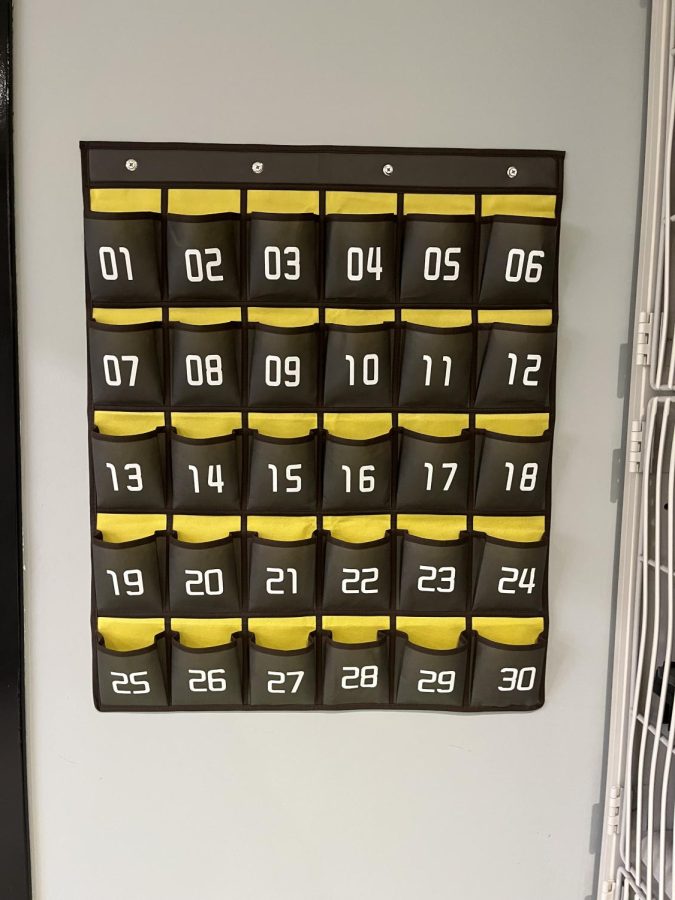The New Phone Policy: How did it start and how is it going?
April 20, 2023
When entering any of the high school classrooms, you may notice a new addition on the wall: phone pouches, or, as commonly dubbed by students, “phone jails.” This new phone policy, which requires students to place their phones in pockets during class periods, started the week of February 27 and is likely to be a permanent establishment for Hastings High School. Mr. Adiepietro, the high school principal, and Ms. Hardesty, the assistant principal, formulated the idea after feeling that phone use throughout the school had gotten out of control.
“I was doing more laps around the building and checking the bathrooms, and every time I checked by a classroom, the kids were on their cellphones. It was absolutely ridiculous,” Ms. Hardesty explained. She further expressed how she noticed that even during study halls and lunch periods, when students have the opportunity and are encouraged to interact with others, they chose to continue using their phones and remained uncommunicative with their peers. Due to this decline in social interaction and the distractions phones were causing within the classrooms, Ms. Hardesty and Mr. Adiepietro realized it was time to take action.
When meeting with the PTSA to propose the idea of a stricter phone policy, Mr. Adiepietro emphasized that “even the parents brought up that the cell phones had become a problem,” demonstrating that this was not only an issue noticeable in the school. A particular instance that resonated with Mr. Adiepietro and acted as his final push was when a senior student came to the office in hopes of implementing a club revolving around social skills. Mr. Adiepietro explained how the student felt that since his peers were constantly on their phones, they were beginning to lose the ability to properly and comfortably communicate with each other, so much so that they felt the need to create a club devoted to revitalizing student social life.
From there, Mr. Adiepietro and Ms. Hardesty ran the idea by the faculty. “It was unanimous,” said Ms. Hardesty, in speaking of teacher approval of stricter phone policies. In fact, some staff members, namely Mr. Lopez and Ms. Driscoll, already owned phone pouches as they had independently implemented the phone policy beforehand.
“Before I first came here, I used the [pouches] and I started to use them here because I didn’t know what the culture in Hastings was. I wanted to make sure that I came off on a good note,” explained Mr. Lopez. “Now that they’re back I think they’re great. I think the phones have gotten out of control and there is a reason this became a rule.”
Although students are now used to the policy as it has become the new normal, there were some hiccups when the pouches were first introduced. Mr. Adiepietro felt that the “first couple weeks were rough,” which he attributed to the withdrawal he assumed students had as they were suddenly separated from their devices. He explained that he found himself having to reinforce the rules with teachers as some were more lenient than others, but at this point everyone seems to be on the same page. From anecdotal feedback, Mr. Adiepietro has found that student anxiety has greatly decreased as a result of the phone policy. He believes that since everyone is in the same boat, students have finally realized that “they’re not missing anything,” which has allowed them to be more focused in class and separate their social lives from their academic lives.
Ms. Hardesty was shocked that “there wasn’t more of a mutiny.” She anticipated a greater resistance to the phone policy, and was surprised that, even though there were a few students who came to her to argue their point against it, it was not a majority of students that were opposed to the pouches.
Mr. Lopez explained how since the phone policy started, “the distractions have been minimized” greatly. In his classes specifically, he noticed that it was not necessarily the issue of students contacting each other, but rather “it is the parents messaging kids, oftentimes about grades and getting them stressed out during class.” He feels that with the new policy, students are more focused on the content during class and are not thinking about a certain missing assignment or a poor grade.
Ms. Barenfeld felt that the transition to the new policy in her classes went “flawlessly from day one.” She, too, was surprised at how smoothly the process went, although she explained that now, there are new sources of distraction in the classroom.
“There’s a shift in how we lose focus in class now, whether that be a little more conversation, or trying to [get away with] things on laptops.”
Ms. Barenfeld also believed that this policy has been particularly effective for students who check their phones anxiously, echoing Mr. Adiepietro’s sentiment that there has been a decrease in anxiety and restlessness surrounding the phones for the students.
Since the policy is still in relatively early stages, it is uncertain whether the phone pouches will be a permanent establishment within the high school, but seeing how they have gone smoothly thus far, it is assumed that they will remain in the classrooms indefinitely.


















